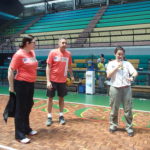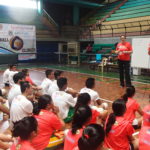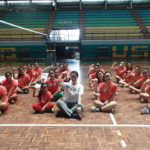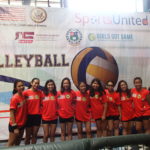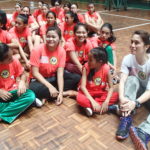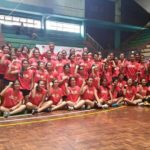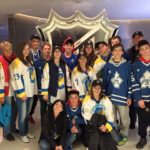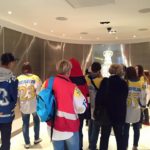From the Philippines to Denmark, GSMP legacy thrives
By Brian Canever January 03, 2016Part of what makes the U.S. Department of State and espnW Global Sports Mentoring Program (GSMP) one of the United States’ most successful diplomatic efforts, especially when it comes to the field of sports, is the ever-expanding web of influence between program participants, mentors, and partners.
The 66 emerging leaders who have participated in the GSMP since its inception in 2012 are remain very connected and engaged with one another and their America counterparts after the exchange experience. As the women say their goodbyes at the end of five weeks in the United States many of them express that, “This isn’t the end, it is just the beginning.” The relationships between emerging leaders, mentors, key program partners—the U.S. Department of State, espnW, the University of Tennessee’s Center for Sport, Peace, & Society—and the U.S. embassies in their home countries thrive long after the emerging leaders board their departing flights.
In today’s blog, we wish to highlight three key examples of alumnae working closely together to spark both instant and long-lasting impact. The cross-cultural and cross-year collaborations are moving each emerging leader one step closer to fulfilling their Action Plans—a ongoing process of empowering women and girls through sports in their local communities and around the world.
Geraldine Bernardo Partners with Sports Envoys in the Philippines
Hardly a moment passes in Geraldine Bernardo‘s day when she is not busy. In addition to her role as the founder of the Sport Management Council of the Philippines (Sportphil), which she launched during GSMP 2012 to promote excellence in sport management, science and business, Geraldine is an adjunct professor at a local university and owns several manufacturing businesses with her husband. Despite the busy schedule, since her return from the inaugural GSMP four years ago, Geraldine has been a willing and active member of the State Department exchange program alumni network at the U.S. Embassy Manila. So when she was contacted in August about contributing to a Sports Envoy program, she did not hesitate to sign up and subsequently served as the backbone of the exchange.
From September 28 to October 3 of 2015, Geraldine co-hosted Sports Envoys Michelle Goodall and Eric Hodgson from USA Volleyball in the second GSMP-Sports Envoy crossover program (the first occurred in Papua New Guinea during the summer and is covered in detail here). The trio worked with dozens of local schools, NGOs, and trainers to put together comprehensive trainings and empowerment programs that benefitted 650 youth and adults.
The program included sports clinics in five different cities – from Manila to Cebu—21 hours to the south—and intensive trainings for volleyball instructors living throughout the Philippines. Hodgson, an 18-year coaching veteran and outreach director for the Arizona Region of USA Volleyball, and Goodall, a 24-year veteran and director of membership development for the organization’s Iowa Region led the trainings and worked closely with Geraldine.
“To give the U.S. Envoys a gist of the level of sport development in my country, I told them to think about America 40 years ago and that is pretty much where we are right now,” Geraldine said. “More often than not, the public school trainers are not P.E. instructors, but rather teachers of science, engineering and agriculture, to name a few subjects. These teachers were thrust into the post to pitch in for the lack of P.E. instructors in the Philippines.”
“Eric and Michelle were so patient, generous and tireless with the teachers,” she added. “Just look at how many teachers they trained in only five short, but very full days!”
A key component of Geraldine’s work after the GSMP has been her initiative, S.W.E.E.P. (Sports for Women’s Empowerment and Employment Program). The initiative places a heavy emphasis on volunteerism, education and inclusivity, stakeholder engagement, and partnerships with related empowerment-focused organizations like Girls Got Game, and especially on “training trainers” to continue the multiplier effect across generations of Filipinos.
“For many of the trainers, the program was like a light bulb for them,” Geraldine said. “One teacher expressed that she has had to unlearn everything that she has ever known about teaching volleyball, which were hinged on outdated, counterproductive concepts.”
The girls who participated in the Sports Envoy program were also deeply touched by the work of Geraldine, Hodgson, and Goodall. For many of the girls, outside of the clinics themselves, they were grateful for the opportunity to participate in a community-supported event that focused on more than just talent.
“This amazing program taught us so much that we can actually apply to our lives,” said Carla Trinidad, who attended a clinic at Muntinlupa National High School. “We had unforgettable moments with our coaches and all the other participants, which helped improve our skills, build confidence, and become strong people, too. Why? Because in sport you have to be strong to accept that sometimes you win and sometimes you lose.”
For an on-the-ground sample perspective from the envoy, please visit this video (courtesy of Eric Hodgson):
Anne-Dorte Andersen’s Hopes for Young Danish Athletes Boosted by U.S. Paralympics Assoc. Director
Anne-Dorte Andersen can look back on her career as a competitive swimmer for Denmark’s national team with a sense of pride. Competing in consecutive Paralympic Games from 1988 to 1996, she won two bronze and one silver medal. But, the path to get to the upper echelons of sport in her country was not easy. Challenges and hurdles along the way may discourage most people. It is for that reason that Anne, a sports project coordinator for the Danish Sport Organization for the Disabled (DHIF), has dedicated her career to creating an easier path for young Danes with disabilities to have access to sport from the recreational to the most elite level.
From October 14 to 18 of 2015, Anne was joined in Denmark by Paul Ackerman, associate director of Paralympic National Partnerships and Programs for the United States Olympic Committee, for a talent development seminar she organized in coordination with the DHIF and the National Paralympic Committee of Denmark in order to train coaches on finding promising athletes.
The visit was coordinated with the help of the U.S. Embassy Copenhagen and SportsUnited Program Officer and fellow Paralympian Ann Cody. The seminar was part of Anne’s Action Plan, Young Athletes Out Front, which she started after GSMP 2014 to create a new generation of Danish champions inside the pool and in life.
“Many countries all over the world are busy creating a pathway for athletes with disabilities to reach their potential,” Anne said. “In many cases in the past, a talented athlete with a disability needed to be in the right place at the right time to be found. The NPC in Denmark has in the past year developed its first talent development strategy, which should govern the way we are going in the coming years. The seminar was the first step to implement the strategy.”
A total of 25 coaches, leaders and NPC staff took part in the talent development seminar, representing six different sports.
“Besides being overwhelmed by the hospitality, I thought the seminar provided a great opportunity to share ideas and best practices for identifying and developing Paralympic-eligible athletes,” Ackerman said. “I was reminded that while our two countries are very different, both are focused on the same thing when it comes to the Paralympic movement and Paralympic sports: to enhance awareness and provide the opportunity for all Paralympic-eligible athletes to compete and reach their highest level of performance.”
“I want to say tak to Anne for being such a gracious host as well as the inspiration behind the exchange,” Ackerman added.
The Fruits of Olga Dolinina’s Work Touch Down at the NHL
Olga Dolinina has been very busy since returning from GSMP 2014. Despite being forced to leave behind her job in marketing and public relations at HC Donbass—Ukraine’s hockey team—followwing the aggravation of the military conflict on Ukraine’s eastern border, she has not lost her connection to hockey in the slightest.
After developing her Action Plan project, “Break the Ice,” as part of the GSMP last year, Olga has gathered considerable media attention in her country for using table hockey tournaments to serve children suffering with post-traumatic stress disorder (PTSD) from the ongoing conflict in major cities like Mariupol and Dnipropetrovsk. She has served hundreds of kids so far, partnering with Save the Children in Ukraine and the United Nations Refugee Agency (UNHCR), and plans to continue expansion into other cities throughout the country after officially registering “Break the Ice” as an NGO this autumn.
On top of her work with table hockey, Olga received gift-in-kind ice hockey equipment this past August as part of a grant from the National Hockey League Players’ Association (NHLPA). She partnered with two youth hockey clubs from Kiev—Sokol and Ukrainochka— as well as the Ministry of Youth and Sport and Palace of Sport, in order to deliver the equipment to the children who most needed it. Ukrainochka is the only female ice hockey team in Ukraine, and Olga’s strategic partnership is aimed at increasing the visibility of female hockey, attracting potential sponsors, and engaging more girls to play.
In September of 2015, Olga partnered with the U.S. Department of State SportsUnited office to send both the Sokol and Ukrainochka teams to the United States on a Sports Visitors program. During the exchange, the teams visited Washington, D.C. and New York City to participate in sports clinics, have a special meeting with U.S. Ambassador to the United Nations Samantha Power, visit the NHL, and attend professional hockey games. During their time at the NHL office, they met with Senior Vice President of Integrated Marketing Susan Cohig, Olga’s mentor during GSMP.
“We at the NHL were thrilled to host Sokol and Ukrainochka, some of Olga’s kids who benefited directly from her ‘Break the Ice’ program,” Cohig said. “Having a connection with one of our emerging leaders come back full circle, as was the case here, reinforces again for the NHL how important the GSMP is and how much impact each talented woman such as Olga can have when implementing her Action Plan.”
Olga visited with the teams at the U.S. Embassy Kiev, where they also had the opportunity to meet with Paralympian rower Oksana Masters, after they returned from the United States. Olga was very excited about the players getting to meet her mentor, Susan, and the impact of learning more about the NHL and what’s possible when you work hard and dream big.
“They were really impressed with the trip and had so many positive emotions,” Olga said. “It gave them additional motivation to continue what they do.”
The GSMP Legacy Thrives
In all three stories—Geraldine, Anne, Olga—the proof of the GSMP’s enduring significance and connection to the lives of the women involved is inspiring. And the continuing relationships between mentors, emerging leaders, the U.S. Department of State and its Embassies, and other partners, is creating a legacy of impact that stretches to every corner of the world and across languages and cultures. The ongoing work of women like Geraldine, Anne and Olga proves true the phrase, “It’s only the beginning.”

